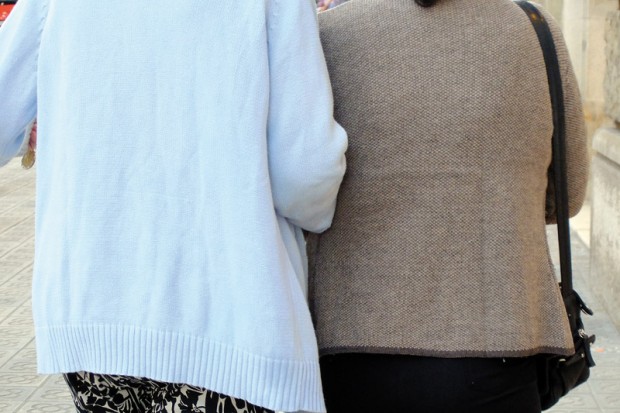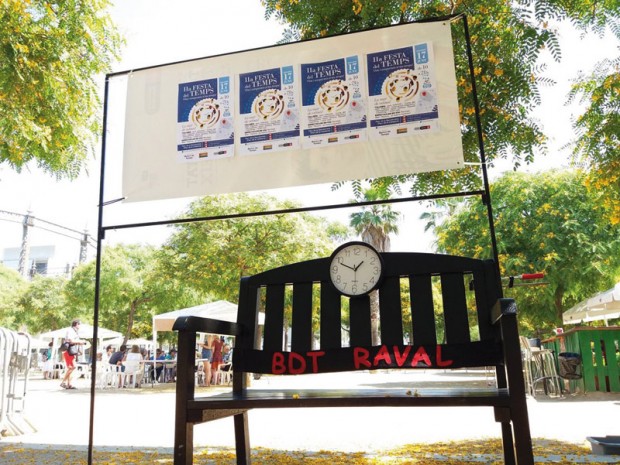
One of the requests to time banks comes from old people who ask for someone to go with them on a visit to the doctor or for a walk.
Photo: Vicente Zambrano
Time banks are spaces where skills can be exchanged without any money changing hands. Instead, the hours people spend providing services to others are deposited in the bank and withdrawn in the form of other services they need.
“Today you, tomorrow me.” The refrain, often said when performing someone an act of kindness and probably dating back to a time before money even existed, resists the passage of time and often gains more relevance in capitalist societies at times of crisis. How do we break free of the commercialisation of everything we consume? How do we free ourselves of giving a “price per hour” for work based on market rates? How do we put a price on a task and from what perspective?
All these questions become unnecessary in communities that build relationships through time banks. Time banks are spaces where skills can be exchanged without any money changing hands. Instead, the hours people spend providing services to others are deposited in the bank and withdrawn in the form of other services they need. Everyone’s hours have the same value: time and exchange are equivalents.
Catalonia currently has a network of more than 80 time banks. Although every bank has its own individual characteristics, they all share a common element: not only do they help to create community ties and chains of favours paid in the form of people’s time, they also strengthen trust and enable participants to feel useful and valued.
Time banks are built on trust. To create one requires a community agreement that assigns a specific value to the initiative. This value is not set by a bank or the market, but by the people making exchanges outside of the speculative economy.
The crisis as an opportunity to create neighbourhood networks
Between 2008 and 2009, as the economic crisis was taking hold in Catalonia, time banks began to proliferate at random in many neighbourhoods throughout the Barcelona metropolitan area. In 2011, following the Spanish anti-austerity movement (known as the 15-M Movement) that began in May the same year, Sergi Alonso, now director of the Association for the Development of Time Banks (ADBdT), realised that there was a need not only to change social dynamics but also to alter the way we relate to money, prompting him to join the Gràcia neighbourhood’s time bank. He committed to establishing an online time bank management platform that would provide a centralised space for information on creating time banks and for sharing best practices. And this is how the Association for the Development of Time Banks was born.
Alonso maintains that through time banks, reduced consumerism and greater environmental awareness are linked to the local organisation, where neighbours are treated as equals, without rules or pressure imposed by the market. Everyone has skills and time, but they may not know much about their neighbours. Why not exchange an English class for a yoga class; repair an electrical appliance in return for some coaching or a car journey; or offer a psychotherapy session in exchange for walking your dog, watering your plants or receiving some IT training?
“Money isn’t everything”, goes another well-known refrain. And sometimes it is difficult to put a monetary value on the satisfaction and development that come from investing time in someone who matters to you or in a subject you have chosen to study, or even in return for a service you thought was out of reach because of the way our economy is structured. But with time banks, personal skills not only open doors to services that money can’t buy but also to an enormous social network.
Online time transactions
Maria Nikolopoulou is a member of the management team at the Sants Time Bank. Some time ago, she says, the time bank replaced its physical time cheques with an online management tool, TimeOverflow. Every member of the bank has a user profile and can access offers and requests without having to go through an intermediary.
The application’s administrators can monitor community exchanges, identify any users who have not made any exchanges in a while and see any disparities between hours given and hours received. Participants who have accumulated a large number of positive hours but do not require a service in exchange can make a donation to users in need. Those who have a negative time balance are encouraged to provide some type of service. This ensures that everyone makes rational use of the bank.
Time banks also have a collaborative wiki where they share information related to this system of exchange. Content is created in a collaborative manner and shaped by the different experiences of the various time banks.

A bench (Catalan banc = bank) and a clock as an allegory of time banking, at the second Time Festival held last June in the Barceloneta neighbourhood.
Photo: Bancs de Temps
Communities of minutes
Like the time banks self-managed by groups of neighbours, the Minuts.cat platform develops exchange projects based on minutes, but users take part in tasks proposed by the corresponding city or town council. Inspired by the GEM Project in South Africa and Time Credit in the United Kingdom, Minuts.cat, a not-for-profit organisation, was set up in October 2016, is currently active in 32 cities and involves some 50,000 people.
The platform is currently piloting a project in the municipality of Figaró-Montmany (Montseny) that encourages local residents to take part in community activities as a way of identifying problems in the area and proposing solutions. Minuts.cat aims to create activities regarding issues of sustainability, culture and public space.
Eduard Folch, founding member of Minuts.cat, says that, regarding sustainability, it was found that more needed to be done to reduce waste and raise public awareness of the problem. As a result, a team was set up to visit people in their homes and advise them on how to reduce and sort their domestic waste. In exchange for being part of the team, members received minutes that they could exchange for certain services selected from an extensive catalogue agreed with the local council.
According to Folch, it can sometimes be difficult to align offer and demand in time banks, and some people who have accumulated large time balances do not know what to spend them on. Minuts.cat aims to broaden the range of offers and options for exchange by enabling minutes to be swapped for leisure activities, theatre tickets or courses at civic centres.
The time restaurant
In 2012, 27 organisations in Terrassa and its Local Association of Organisations for Social Inclusion (ALEI) opened a restaurant, La Trobada, to address the exponential rise in long-term unemployment and the increasingly vulnerable situation faced by young people as a result of the economic crisis that had been dragging on since 2007.
La Trobada is a time restaurant where unemployed people can work on a voluntary basis. People at risk of exclusion are able to eat at the restaurant every day, thanks to support from organisations belonging to the Local Association of Organisations for Social Inclusion, as well as from the NGO Càritas and the City Council. Pau Consola, one of the coordinators, says that the majority of people in poverty rely on social canteens or food banks, neither of which help them to reintegrate into the social fabric or labour market. For that reason, they opened the restaurant, enabling users to use their time constructively and feel a sense of purpose while receiving training. Customers of the La Trobada time restaurant are people who are living in social isolation or whose relationships with friends — and even family — have broken down. Spending time in the time restaurant has helped them to eat better, feel valued and benefit from training related to the hotel and catering sector, thus providing them with a path to re-joining the workforce.
La Trobada understands that, even when people have no money, they still have the time and the capacity to make a valuable contribution, time that the labour market does not recognise. Many of those who have worked in the time restaurant have gone on to find paid jobs.
Inspiring projects
Maria Nikolopoulou, of the Sants Time Bank management team, keeps abreast of international initiatives based on cooperation between time banks and their corresponding local authorities. For example, the Spice project in England works with the national primary healthcare system to “prescribe” attendance at a time bank for very inactive people. It also assesses people’s health both before and after joining one of these organisations.
The Sants Time Bank is also in contact with a project in Switzerland, where the authorities provide support in euros to a pension fund in hours. Over a number of years, people provide help and support to their ill or elderly neighbours in exchange for “contribution” hours. Then, when they themselves need help, they receive this “pension plan”.
These two projects may serve as a source of inspiration for time banks in this country.
Rebuilding the social fabric to bring about a paradigm shift
“At the end of the day, hours are an excuse to feel valued. In short, people come so that they can solve emotional issues and meet new people, either after a major social change or because they no longer feel comfortable with their old social network”, says Jordi Macià of the Berga time bank. Each time bank has its own peculiarities: some people work with neighbourhood networks in an effort to improve their confidence; others to feel valued, such as Aiman Khater, from Syria, who arrived in Berga as a refugee and has accumulated scores of hours because he has not stopped doing things for his neighbours, or Montse, from the Pont del Dimoni time bank in Girona, who spent four days in Berga through a travel agency managed with time-bank hours, which gives accommodation and activities in exchange for time.
The possibilities are endless, although all collaborative projects have a significant social value, developed by people who, more than just being a group of locals who spend time together, are one of the essential factors for bringing about social and economic change and questioning the established ways that people relate to each other.
“Save time by helping your community” is one of these time banks’ slogans. Save without investing, turning the market around, placing a value on time and creating an economic and social alternative. “Time is gold”, or so the saying goes, but perhaps this is even more true when you can decide to whom and to what you dedicate it and how you save it. That is the magic of time banks: they don’t manufacture or produce anything. Instead, they place a value on what only we ourselves can control: our time and human relationships in an equal exchange.


